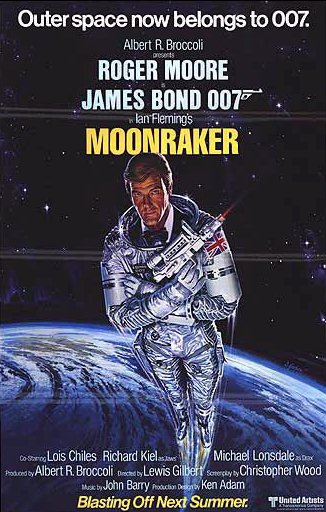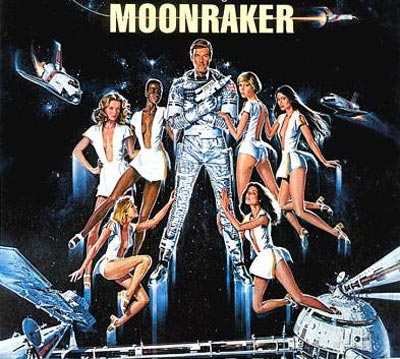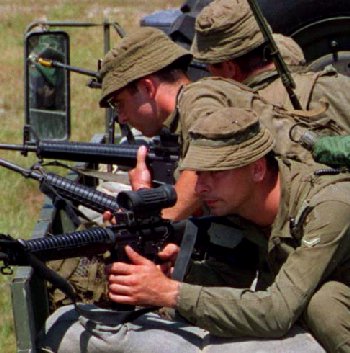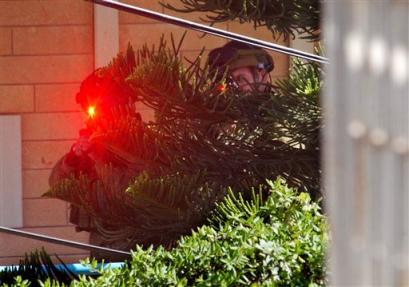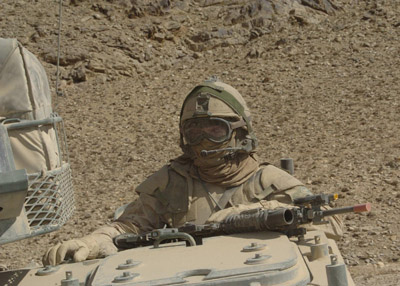|
|
|||||||||||||||||||||||||||||||
|
Laser Weapons in the Hands of Canadian Soldiers
By Monique Bellamont - November 2007. Remember the laser guns from the 007 movie Moonraker? In 1979 James Bond blasted into space to fight an evil villain intent on destroying the human race and re-seeding the earth with a race of super-humans. Well by 2007 (nearly 30 years later) laser guns in the hands of the armed forces are now becoming a reality, but not in the way we expected it. For year we've been told not to point laser pointers at a person's eyes because you might damage their eyes, but now the military is going to do so deliberately... The Canadian Forces are taking a leap into the 21st century and are discussing a plan to outfit the troops in Afghanistan with lasers... but with one big difference. These high-tech weapons are actually non-lethal and are designed to blind their targets. The argument is that the blindness will be temporary, but so little research has been on the topic we don't know for certain that is true. It could cause permanent blindness. With the recent incident of the taser death in Vancouver Canada there is certainly a push for non-lethal alternatives to tasering people like Robert Dziekanski to death. (The taser is meant to be used once [and only once!] on a target, but a group of trigger-happy RCMP officers in the Vancouver international airport instead tasered the man up to 4 times and killed him.) The Canadian military is looking at buying laser weapons designed to temporarily blind individuals as part of its efforts to reduce the number of innocent Afghans killed or wounded by troops for failing to heed warnings not to approach military convoys.
The systems, generally referred to as laser dazzlers, are capable of "disrupting" the vision of a person 50 to 500 metres away, depending on the specific type of model used, although it has not been tested to determine whether it could permanently blind people. The military wants to mount the dazzlers on rifles and vehicles, mainly for use in protecting convoys. It's hoped the systems might reduce the number of Afghan civilians killed or injured by soldiers after failing to heed commands to stop at checkpoints or not approach convoys. So far at least 22 Afghans have been wounded and another nine killed in such incidents. Canadian military officials worry such incidents are harming efforts to win over people in Kandahar. The laser systems are considered non-lethal weapons by Defence officials, although some in the military prefer to refer to them as warning devices as opposed to weapons. Being hit by a dazzler is akin to looking directly into the sun during an eclipse they claim. Other systems on the market make use of a light emitting diode, or LED, to project an intense beam to disorient an individual. Dazzlers from two companies are being considered by the Canadian Forces but military officials declined to provide details. "The Department of National Defence always considers ways to protect our Forces and reduce the potential of causing unintended harm to civilians," said spokesman Major Norbert Cyr.
Last year the Pentagon in the United States acknowledged that some American troops in Iraq were using such devices on their rifles. A Pentagon official said the systems were designed to cut down on the number of shooting of Iraqis at checkpoints. Canada has ratified a treaty that prevents the use of weapons that cause permanent blindness or eye damage which means they can now start using such weapons. The manufacturers of the dazzlers, however, acknowledge they can permanently damage a person's eyes if used at close ranges. What isn't clear, however, are the steps Stephen Harper's government are taking to test such systems in preparation for acquiring them and then sending them to Afghanistan. Harper and the Conservative Party say they are fast-tracking the testing of new technology (which normally takes years to test and approve) and trying to get it down to mere months, which means the troops would be the testers effectively. In meetings in 2003 and 2005, Defence and Foreign Affairs officials met with the Red Cross to discuss improving procedures for examining the capabilities of weapons at the time of purchase. This was being done to comply with a protocol of the Geneva Conventions and ensure a nation has detailed information in place to show any new weapon does not violate various treaties the country has signed.
Isabelle Daoust, an Ottawa-based lawyer with the Canadian Red Cross, said technical and legal experts, as well as doctors are needed to analyze information about any new weapon, but the Conservative government wants to ignore such regulations. "The lawyer is there to lay out the legal standards, but someone needs to make that assessment whether the weapon is up to scratch with the standards that are there," said Daoust. "It would be a tough call to make in isolation," she added. "I would think you would need to have a few people around the table to make a serious assessment." There are already number of portable laser dazzlers out on the market. LE Technologies of the U.S. sells a compact hand-held dazzler "specifically designed for applications where subject vision impairment must be achieved at distance, in very bright ambient conditions including clear sunny daylight," according to the company's promotional material.
The firm claims that their tests show there is no permanent damage to an individual's eyes after repeated exposure to the dazzler. China has also equipped its security forces with laser dazzling weapons for riot control and in August it was reported India's army also plans to acquire laser dazzlers. An Indian government defence research centre had developed two such systems for use in counter-insurgency operations. Those systems have ranges of between 50 and 500 metres. They use intense visible light and produce a flickering green laser beam that is enough to temporarily blind or disorient a person. One thing we can be certain about: Real laser weapons won't as exciting as those portrayed in the movies.
|
|
||||||||||||||||||||||||||||||
|
Website Design + SEO by designSEO.ca ~ Owned + Edited by Suzanne MacNevin | |||||||||||||||||||||||||||||||
